Rainforest Foundation Norway at Climate Week NYC 2025: Building alliances for forests and their guardians

Rainforest Foundation Norway and partners at the Nature Hub at NYCW. From left to right: Jamer López (ORAU), Fany Kuiru (COICA), Jorge Pérez (AIDESEP), Ines Luna Maira (RFN), Sushil Raj (WCS), Tørris Jæger (RFN), Jessica Webb (WRI), Joël Wengamulay (ICCN) and Théophile Gata (CAGDFT). Photo: Pedro Melo/RFN
By Rainforest Foundation Norway.
Every September, Climate Week NYC brings together governments, civil society and business leaders in parallel with the UN General Assembly, making New York a global stage for climate action. This year, the urgency could not have been clearer.
While U.S. President Donald Trump used his UN speech to dismiss climate science and undermine international cooperation, Climate Week became a vital counterpoint: a space to lift solutions, strengthen alliances and mobilize against the political forces that threaten progress.
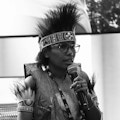
“We are already leading the defense of our forests, our rights and our future. We invite the world to walk alongside us.”
Yunes Bonay, Executive Director of Bentara Papua
For Rainforest Foundation Norway (RFN), being present in New York was more important than ever. Together with Indigenous leaders, civil society partners, governments, donors and faith communities, we highlighted how rainforest protection and Indigenous Peoples and Local Communities’ rights are indispensable to solving the climate crisis.
Over the week, we organized four events at the ‘Nature Hub’, each pointing to a common truth: The world’s rainforests are at the heart of the climate and biodiversity crises – and the solutions. Climate Week NYC was a pivotal moment to accelerate action.
Together with partners and through compelling stories and evidence-based solutions, we showcased how Indigenous Peoples and Local Communities are protecting forests, advancing nature-positive economies and driving systemic change.

Yunes Bonay, Executive Director of Bentara Papua, and Sinta Lestari, Head of the Indonesia and Papua New Guinea Program at RFN, speak at an event about Papua at the Nature Hub. Photo: Arin Sang-urai/Nature4Climate
Papua: One of the world’s last great rainforest frontiers
Papuan youth are rising as powerful forest defenders, combining Indigenous knowledge, eco-enterprise and digital tools to protect land, rights and identity. Speakers emphasized that Papua’s forests are globally vital: a climate safeguard and cultural stronghold. Indigenous youth and women are leading innovative solutions rooted in tradition, yet systemic threats such as large-scale agribusiness projects endanger both forests and rights.
Breaking barriers: Indigenous and community governance reshaping climate finance
The RFN report ‘Falling Short’ showed that less than 1% of climate finance reaches Indigenous Peoples and Local Communities who safeguard the world’s forests. At Climate Week NYC, we convened Indigenous leaders, policymakers and allies to explore how community-driven finance can flip this imbalance. The Community Fund for Forests (CFF) in the Democratic Republic of Congo shows how a fund designed and governed by communities themselves can channel resources directly to forest guardians, strengthen territorial governance and deliver measurable impact.
In parallel, the Isolated Peoples’ Corridors initiative in the border of Brazil and Peru underscored the urgency of protecting the last territories of Indigenous Peoples in voluntary isolation. To build a lasting protection, the living conditions of communities neighboring these corridors must be improved by strengthening their own governance to build resilient communities on the front lines.
Together, these initiatives offer more than promising models: they prove that shifting power to communities is not only equitable but also the most strategic way to protect forests, rights and the planet.
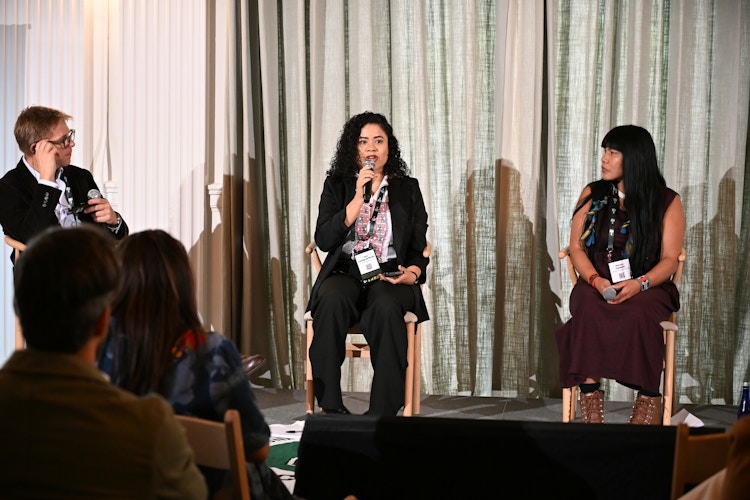
Panel discussion at and event about socio-bioeconomies in the Amazon at the Nature Hub. From left to right: Tørris Jæger (RFN), Letícia Moraes (CNS) and Watatakalu Yawalapiti (ATIX/ANMIGA). Photo: Hugo Metz/RFN
ForEco: Advancing socio-bioeconomies in the Amazon
Indigenous Peoples and Local Communities in the Amazon are building forest-based economies that protect nature and sustain livelihoods. Our ForEco network convened partners from Brazil and across the Amazon to discuss pathways for scaling socio-bioeconomies: forest-based economies of diversity that preserve ecosystems while strengthening local governance. Women and youth are central to these economies taking on leading roles in driving positive change. To scale up requires political will, public policies and donor commitment.
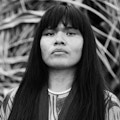
"Women are the roots of our forest economies. When we lead, we ensure that knowledge, culture and land are passed on to the next generations. Without women, these economies cannot thrive."
Watatakalu Yawalapiti, Indigenous Activist and Entrepreneur of the Xingu Indigenous Land Association (ATIX/ANMIGA)
Indigenous Peoples are scaling up their efforts across the entire
Amazon basin. Fany Kuiro, General Coordinator of the Coordinating Body
of Indigenous Organizations of the Amazon Basin (COICA), highlighted how
women are driving this work at a pan-Amazonian level. Indigenous-led
forest economies have proven to be a viable model for a thriving Amazon.
Through initiatives such as the Amazon for Life Fund and the CON AMAZONIA
brand, COICA is building a pan-Amazonian framework to expand these
economies—ensuring that keeping the forest standing generates dignified
livelihoods through direct, debt-free financing and market access rooted
in Indigenous values.
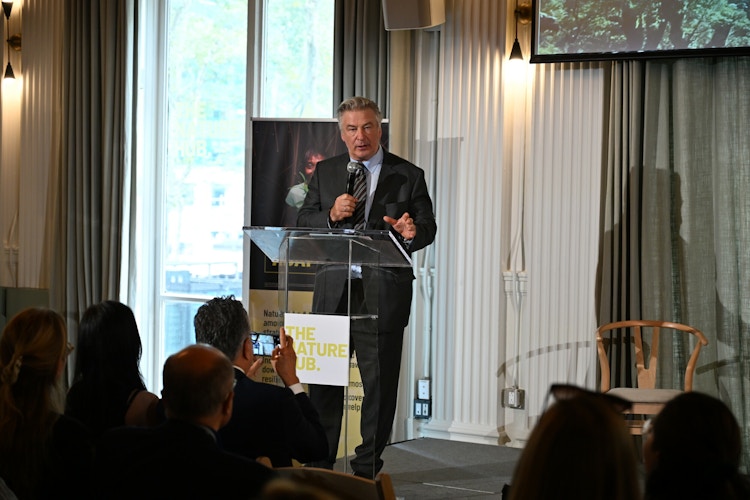
Actor and activist Alec Baldwin speaks at an event about the Interfaith Rainforest Initiative at the Nature Hub. Photo: Hugo Metz/RFN
Interfaith Rainforest Initiative 2.0: Faith as a force for forests
Faith leaders are rising as bold voices for truth, justice and climate action. The Interfaith Rainforest Initiative (IRI) demonstrated how faith leaders are uniquely positioned to combat misinformation, bridge divides, and inspire action. With 85% of humanity identifying with a religion, IRI leverages moral and spiritual authority to advance forest protection and Indigenous rights.

“People don’t act on facts alone. They act on trust — and that is where faith communities can make a decisive difference on making the protection of the world’s rainforest a shared duty across religions.”
Alec Baldwin, Actor and Advocate
A high-level reception to strengthen partnerships
Beyond the Nature Hub sessions, RFN also co-hosted a high-level reception with the Royal Norwegian Consulate General in New York to spotlight the role of rainforest protection in achieving global goals on climate, biodiversity and human rights. It underscored Norway’s long-standing leadership in supporting Indigenous rights and climate solutions, while offering an important space to build new alliances ahead of COP30.
Deputy Foreign Minister Andreas Motzfeldt Kravik emphasized that rainforest protection is not only an environmental responsibility but also essential for economic stability and geopolitical security, and that safeguarding Indigenous Peoples and their human rights defenders must remain a priority.
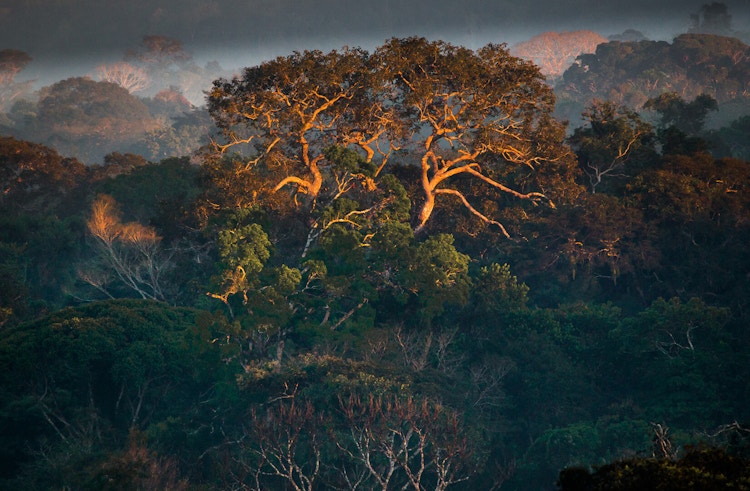
A tree in the Brazilian Amazon. Photo: Araquém Alcântara
Looking ahead: The road to COP30
At Climate Week NYC, Rainforest Foundation Norway and partners underlined that the defense of rainforests depends on long-term alliances: between Indigenous Peoples and Local Communities and donors, between local knowledge and global policy, and between faith and science.
The journey now continues toward COP30 in Belém, Brazil, where rainforest protection and Indigenous Peoples and Local Communities rights must be at the center of the global climate agenda. Climate Week underscored the urgency and the solutions already in motion. RFN will continue working with partners to ensure that by COP30, the world recognizes that protecting rainforests and empowering their guardians is not peripheral climate action: it is the foundation of it.

